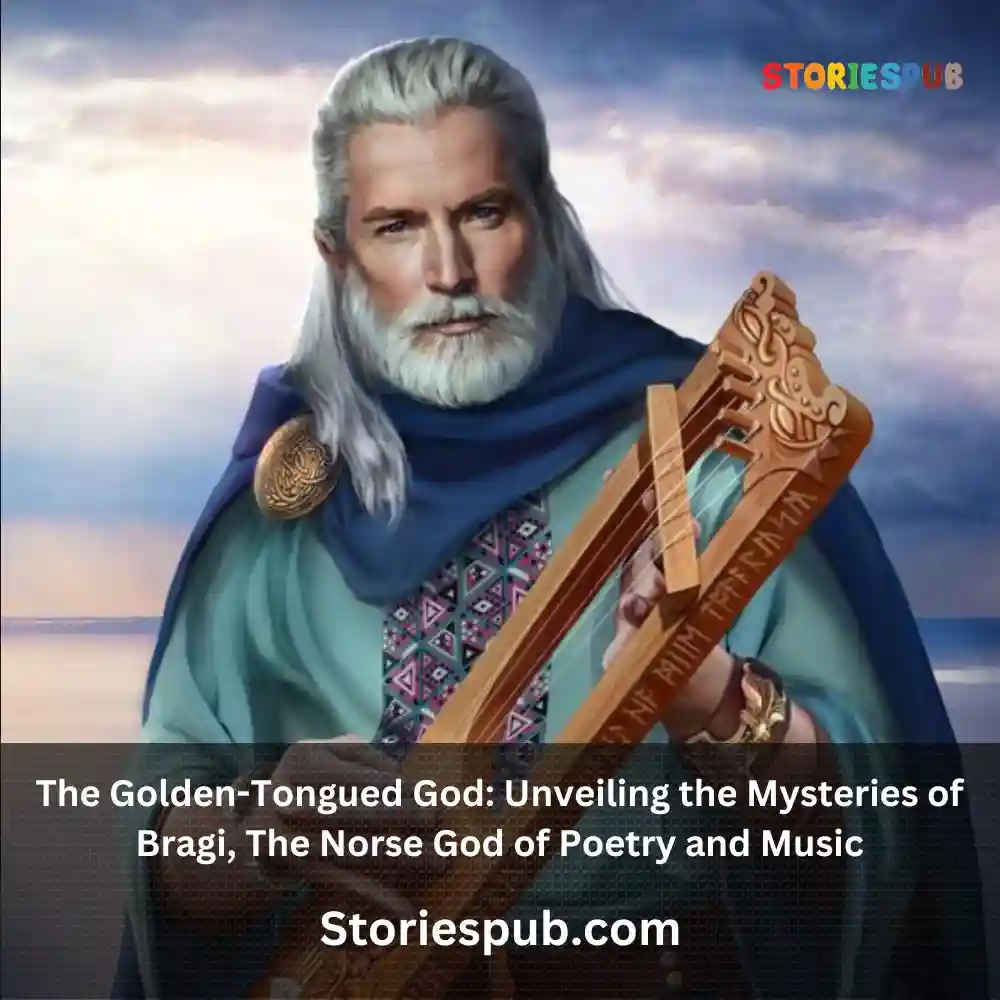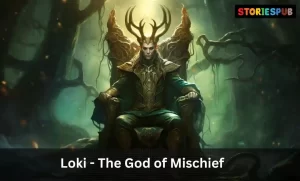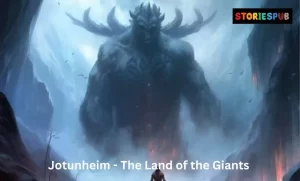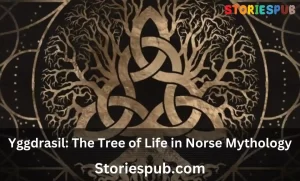The Golden-Tongued God: Unveiling the Mysteries of Bragi, The Norse God of Poetry and Music

Image credit : Pinterest
Introduction
In Norse mythology, Bragi is the god of poetry and music. He is one of the lesser-known gods, but his importance in Viking culture cannot be overstated. Bragi was revered by poets and musicians alike, who saw him as a source of inspiration and creativity.
The name “Bragi” comes from an Old Norse word meaning “poetry”. According to legend, Bragi was born to Odin, the king of the gods, and Gunnlod, a giantess who guarded the mead of poetry.
This mead was said to give whoever drank it the gift of eloquence and wit. Bragi inherited this gift from his mother and became known as the god of poetry.
Bragi is often depicted as a wise and peaceful figure with long blonde hair and a bushy beard. He is usually shown holding a harp or lyre, instruments that were commonly used in Viking music.
Although he may not be as well-known as some other Norse gods like Thor or Loki, Bragi was an important figure in Viking culture. Poets would often invoke his name before reciting their work or composing new pieces.
Musicians would dedicate their performances to him in hopes of receiving his blessings. In addition to being associated with poetry and music, Bragi was also believed to have prophetic abilities.
In some stories, he predicts future events such as Ragnarok (the end times) and even foresees his own death. Overall, Bragi played an important role in Viking culture as both a source of inspiration for creativity and a symbol of wisdom and prophecy.
Bragi’s Origins and Family
Parentage of Bragi
Bragi was the son of the king of the gods, Odin, and a giantess named Gunnlod. This made Bragi a half-god, half-giant. Although he was not as well-known as some of his half-siblings, like Thor and Baldr, Bragi was an important figure in Norse mythology because of his role in promoting the arts.
Siblings of Bragi
Bragi had several siblings from both his mother’s side and father’s side. Some of his siblings included Baldr, Thor, Vidar, Heimdallr, Hermodr and Tyr. In particular, Baldr was very close to Bragi.
The two were known to be good friends. Additionally, since both were gods associated with peace and love rather than battle like many other Norse deities were known for – they had quite a bit in common.
How did Bragi become the god of poetry and music?
According to legend or myth (depending on ones view), one day Odin asked Bragi to entertain him with stories about various topics while they drank mead together from golden cups. After completing each tale or story that he told Odin – Odin began asking for more complex stories – riddles that called upon all aspects that make up language. The riddles proved very difficult but ultimately led Odin to realize how skilled at wordplay and how eloquent Bragi actually was – he then appointed him the god over poetry.
From that point forward it was believed by Norse mythology followers that any time someone spoke something creative or flowing tongue-wise – they were invoking Bragi’s power. Bragi eventually became revered throughout Viking culture due to this association with creativity—leading him towards being considered as not just someone who inspired creativity, but as a god of truth in words and thought as well.
Bragi’s Appearance and Personality
Blonde Hair and Beard
Bragi was known for his striking appearance, with long blonde hair that flowed down to his shoulders and a well-groomed beard. The Vikings believed that a man’s hair was an extension of his power, and Bragi’s golden locks were a testament to his godly status.
His beard was trimmed neatly, highlighting his chiseled jawline and giving him an air of sophistication. In Norse mythology, physical appearance was often seen as a reflection of one’s personality.
Bragi’s flowing hair and immaculate beard were indicative of his wisdom and eloquence. He was regarded as the most beautiful of all the gods, both in body and spirit.
Wise, Eloquent, Peaceful
Bragi’s appearance wasn’t the only thing that set him apart from the other gods. He possessed an unmatched intellect and eloquence that made him highly respected among mortals as well as other deities.
His words were said to be like honey in the ears of those who heard them. In addition to being wise and eloquent, Bragi was also known for his peaceful nature.
While many of the Norse gods were quick-tempered and prone to violence, Bragi preferred peace over conflict. He believed in using words instead of weapons to resolve disputes.
Bragi’s peacefulness made him highly revered among poets and musicians who saw him as a source of inspiration for their craft. They believed that by invoking Bragi’s name or calling upon him in prayer they could tap into his creative energy.
The Significance of Personality Traits
In Norse mythology, personality traits were not just superficial characteristics but integral parts of a deity’s essence. For example, Thor was known for his bravery while Odin was revered for his wisdom. Similarly, Bragi’s appearance and personality were closely intertwined.
His physical attributes, such as his flowing hair and well-groomed beard, were seen as reflections of his inner wisdom and eloquence. Likewise, his peaceful nature was a testament to his desire for harmony and tranquility.
In many ways, Bragi embodied the ideal of what a Viking man should be – wise, eloquent, and peaceful. While he wasn’t the strongest or most powerful of the gods, his influence extended far beyond just poetry and music.
Conclusion
Bragi’s appearance and personality set him apart from the other gods in Norse mythology. His striking physical features were matched by an unmatched intellect and eloquence that made him highly respected among mortals as well as other deities. His peaceful nature made him a source of inspiration for poets and musicians alike who saw him as a guide to creativity.
In Norse mythology, personality traits weren’t just superficial characteristics but integral parts of a deity’s essence, making Bragi’s appearance all the more significant. Overall, Bragi embodied the ideal Viking man – wise, eloquent, and peaceful – making him one of the most revered gods in Norse mythology.
Bragi’s Role in Norse Mythology
Revered by Poets and Musicians Alike
Bragi was held in high esteem by poets and musicians throughout the Viking Age. He was seen as the patron god of all things related to art and creativity.
Skalds, or Viking poets, would often ask for his inspiration before composing their work. They believed that Bragi could imbue them with the gift of eloquence and creativity, allowing them to produce works of great beauty.
Musicians also looked to Bragi for inspiration when composing their songs. They believed that he could imbue their melodies with a magical quality that would captivate audiences.
Throughout history, numerous poems have been written about Bragi, each one extolling his virtues as the god of poetry and music. Even today, he continues to be celebrated in modern literature and music.
Inspiring Creativity in Mortals
Bragi inspired creativity not only among poets and musicians but also among all mortals who sought to express themselves artistically. He was known to appear before people who were struggling with writer’s block or other creative obstacles, giving them guidance and inspiration.
According to legend, Bragi once appeared before a young boy who desperately wanted to become a poet but lacked any natural talent. The boy pleaded with Bragi for help, asking him how he could become a great poet like those he had heard singing praises about the god’s greatness.
Bragi took pity on the boy and offered him a deal: if he agreed to dedicate himself fully to learning the craft of poetry, Bragi would grant him inspiration whenever it was necessary. The boy accepted this bargain eagerly and went on to become one of the most famous skalds in Viking history.
This story illustrates how Bragi inspired mortals not just through divine intervention but also through his example. By embodying the qualities of creativity, eloquence, and wisdom, he served as a role model for all who sought to express themselves artistically.
Bragi’s Role in Mythology
Bragi played an important role in many of the Norse myths. One of the most famous stories involving him is that of his wedding to the giantess Gunnlod.
According to legend, Odin had sent Bragi to retrieve a magical mead that had been brewed by the giants. Bragi succeeded in his mission and returned with the mead, which he shared with Gunnlod.
As they drank together, Bragi fell in love with Gunnlod and asked her to marry him. She accepted, and they became one of mythology’s legendary couples.
Bragi also played an important role in Ragnarok, the Norse apocalypse. According to legend, he was one of several gods who survived this catastrophic event and went on to help rebuild the world from its ruins.
Overall, Bragi’s role in Norse mythology was significant and far-reaching. He served as both a divine inspiration for artisans throughout history and a central figure in many beloved legends and myths.
Legends Involving Bragi
Bragi and Loki’s Flyting
One of the most famous legends involving Bragi is his flyting, or verbal battle, with the trickster god Loki. According to the tale, Loki challenged Bragi to a contest of wit and poetry while they were both guests at a feast in Aegir’s hall.
The two exchanged insults and jabs at each other’s abilities until Bragi emerged as the clear victor. This legend not only showcases Bragi’s quick wit and cleverness but also highlights his important role among the gods as the patron of poets.
Bragi and Freya’s Necklace
Another story involving Bragi is his involvement in the retrieval of Freya’s necklace, Brisingamen. When Freya discovered that her prized possession had been stolen by four dwarves, she enlisted the help of Heimdall to retrieve it. Heimdall then recruited Bragi to help him infiltrate the dwarven stronghold where they found themselves trapped by a raging fire set by the dwarves.
However, using his powers of eloquence and persuasion, Bragi was able to convince them to release him and Heimdall unharmed in exchange for a taste of his mead. This tale not only demonstrates Bragi’s skills as an orator but also how highly revered he was among both gods and dwarves.
Bragi and Ragnarok
Bragi also played a significant role in one of Norse mythology’s most well-known events – Ragnarok. According to legend, during this apocalyptic event that marked the end of times for both mortals and gods alike, he will lead fallen warriors into Valhalla alongside Odin himself.
Additionally, some traditions describe him as engaging in combat during this final battle against giant beasts like Fenrir or Jormungand. This tale solidifies Bragi’s position as a warrior-poet and his importance in the eyes of the gods.
Bragi’s Role in Poetry
While not a specific legend, it is worth noting Bragi’s influence on ancient Norse poetry. His name itself became associated with the art of poetry, with “bragarfull” (Bragi’s cup) being used to describe a particularly poetic verse.
In addition, poets would sometimes refer to themselves as “Bragi” or claim that their inspiration came from him directly. This showcases how important Bragi was not only among the gods but also among mortals who sought to become better poets and musicians.
Beyond Legends: Bragi’s Legacy
Beyond these specific tales involving Bragi, his legacy can be seen woven throughout Norse mythology and even modern popular culture. He continues to be revered as a god of creativity and inspiration, inspiring countless artists throughout history.
His name has appeared in music albums, comic books, and even video games like Assassin’s Creed Valhalla. The impact he has had on human expressions of creativity is immeasurable, making him one of the most important gods in Norse mythology.
Worship of Bragi
The Importance of Worship
In Norse mythology, the gods held a significant role in the lives of the Vikings. The people of this culture believed that the gods controlled every aspect of their lives, including their daily activities and fortunes.
Therefore, it was essential to worship and honor these deities to ensure good luck and fortune. Bragi was one such god who played an integral part in Viking society and was worshipped for his unique abilities as the god of poetry and music.
Offerings to Bragi
The Vikings made offerings and sacrifices to their gods as a way to show respect and ask for their favor. To honor Bragi, they offered drinks such as mead or ale, which were believed to be his favorite drinks. Additionally, as a symbol of respect, poets would pour some drops of ale on the ground before drinking from their cups.
Another common offering made to Bragi was music in various forms such as chanting or singing songs about him. The Vikings believed that offerings made with devotion would please him and inspire them with creativity.
Rituals Praising Bragi
The worship ritual performed for Bragi involved praise songs sung by poets or bards in his name accompanied by music on instruments like harps or lyres. These rituals were performed during significant events like harvest festivals or weddings where there would be a gathering of people. During these gatherings, poets recited songs praising the adventures and accomplishments of the god while musicians played instruments that enhanced the performance’s impact.
The Role Of Poetry In Worshiping Bragi
Poetry played an important role in worshipping Bragi because he was considered its patron deity. The Vikings saw poetry and music as sacred forms through which they could communicate with their gods; therefore, crafting poems dedicated to him helped to build a closer connection with him.
Poets often wrote and recited poems describing the god’s attributes, accomplishments, and how they inspired creativity in mortals. These poems formed an essential part of Viking culture, and the people believed that they had to honor Bragi by continuing to create more poetry.
Bragi In Art And Architecture
Bragi’s influence was evident in various art forms created during the Viking era. The most visible form was on runestones, which were inscribed with his name or mentioned him as the patron of poets and musicians.
Additionally, his image was often depicted on Viking jewelry such as necklaces or brooches, where he appeared as a wise elder with a long beard and hair. Bragi’s influence can also be seen in architectural structures like longhouses built for wealthy Vikings where large halls would serve as performance spaces for poets and musicians.
Conclusion
Worship of Bragi played an important role in Viking society because he represented creativity through poetry and music. The Vikings believed that by pleasing him through rituals or offering, he would inspire them with new ideas and help them become better poets or musicians. Through worshiping Bragi, the Vikings were able to maintain their cultural identity while creating art forms that have continued to inspire generations up until today.
Modern Interpretations
Bragi in Modern Media
Bragi may come from ancient myths, but he has since appeared in various modern media, ranging from movies to comic books. Such portrayals of Bragi tend to be highly romanticized, depicting him not only as a god of poetry and music but also as a figure embodying all things artistic and beautiful. In pop culture, Bragi is often portrayed with long hair and a beard, wearing traditional Viking clothing, and playing a harp or lyre.
In the Marvel Cinematic Universe, for example, Bragi is briefly mentioned in “Thor: Ragnarok” (2017) as Thor’s former roommate who had moved out before the events of the movie. In Neil Gaiman’s book “Norse Mythology” (2017), Bragi is featured prominently as one of the main gods of Asgard.
He is depicted as witty and charming with an affinity for music and songwriting. In Rick Riordan’s “Magnus Chase and The Gods of Asgard” series (2015-2017), Bragi is portrayed more seriously as an old god struggling to adapt to modern times.
Bragi in Music
It only makes sense that a god associated with music would inspire modern musicians today. One such band that takes inspiration from Norse mythology (and by extension Bragi) is Wardruna – an experimental Nordic folk band founded by Einar Selvik in 2003.
Selvik himself has stated that his music was heavily influenced by his interest in Norse mythology and specifically the symbolism surrounding each of the gods. Wardruna’s sound combines traditional Nordic instruments such as kraviklyra (Norwegian bowed lyre), tagelharpe (horsehair fiddle), goat horn, and mouth harp.
They also incorporate natural sounds such as leaves rustling, fire crackling, and water flowing. The band’s lyrics are usually written in Old Norse or Proto-Norse, adding to the overall authenticity of their music.
The Influence of Bragi on Literature
Writers and poets throughout history have drawn inspiration from Bragi’s association with poetry. From the Anglo-Saxon “Beowulf” to the modern poetic works of Sylvia Plath and Margaret Atwood, Bragi has influenced countless writers who are drawn to his wisdom and eloquence.
One example is the Icelandic writer Halldór Laxness who won the Nobel Prize in Literature in 1955. Laxness’ 1934 novel “The Great Weaver from Kashmir” features a protagonist named Geirþrúður – a young woman who discovers her talent for writing poetry after being visited by a spirit believed to be Bragi himself.
Bragi’s Legacy in Modern Poetry
Bragi continues to inspire modern-day poets with his association with creativity and artistic expression. One example is American poet Jim Harrison whose poem “Bragi Poem” celebrates Bragi as the god of music, dance, and creative expression:
“The god of poetry is tall and sends us messages
from his hammer dulcimer. The muse within us,
the good angel, sings through our blood.”
While much has changed since ancient Viking times when Bragi was first revered as a god of poetry and music, it is clear that his legacy continues to influence artistic expressions today. Whether it be through literature or popular culture icons such as Marvel’s cinematic universe or through modern-day musicians such as Wardruna or poets like Jim Harrison-Brage remains an inspiring figure for those seeking creative expression in all forms.
Conclusion
In Norse mythology, Bragi played a crucial role in inspiring poets and musicians. He was a wise and eloquent figure who offered guidance to those who sought out his wisdom.
Bragi the god of poetry and music was an essential figure in Norse mythology. He inspired creativity among mortals, and his legacy lives on today. His presence is felt throughout the Viking culture, where his influence is evident in music, literature, and other forms of art.
His role as the god of poetry and music made him one of the most important figures in Viking culture. Through his various legends, Bragi demonstrated his importance to the gods and mortals alike.
From his interactions with Loki to his involvement in Ragnarok, Bragi’s impact on Norse mythology cannot be overstated. The worship of Bragi was an integral part of Viking culture.
People would offer him gifts or perform rituals to honor him. This devotion reflects how highly he was regarded by Vikings during that time.
Modern interpretations of Bragi showcase how relevant he remains today. From popular TV shows to video games, Bragi’s influence can be felt in various forms of media.
His legacy continues to inspire creativity among people all around the world. Bragi’s importance in Norse mythology cannot be overstated.
He inspired creativity among mortals while being revered by gods for his wisdom and eloquence. Today he continues to inspire people from all walks of life through various forms of media such as music or literature.
Hey kids, how much did you like The The Golden-Tongued God: Unveiling the Mysteries of Bragi, The Norse God of Poetry and Music ? Please share your view in the comment box. Also, please share this story with your friends on social media so they can also enjoy it, and for more such Norse Mythology, , please bookmark storiespub.com.
Related Post :
Bragi FAQ
What is Bragi's role in Norse mythology?
Bragi serves as a patron of poetry and music, and his skill in these arts is highly respected by the other gods and goddesses.
What does Bragi look like?
Bragi is often depicted as a handsome man with long hair, carrying a harp or lyre.
Is Bragi worshipped in modern times?
Bragi is not worshipped as part of any organized religion in modern times, but he is still studied and appreciated by scholars and enthusiasts of Norse mythology.
What is the significance of Bragi in Norse culture?
Bragi represents the importance of poetry and music in Norse culture, as well as the idea that these arts can inspire and uplift people.
Are there any symbols associated with Bragi?
Bragi is often associated with the image of the harp or lyre, as well as with the concept of inspiration and creativity.
Is Bragi similar to other gods of the arts in other mythologies?
The concept of a god of the arts is found in many mythologies throughout the world, and there are some similarities between Bragi and other gods of the arts, such as the Greek god Apollo and the Hindu god Saraswati.
Are there any stories involving Bragi?
Bragi appears in several Norse myths, including one in which he competes in a poetry contest with another god, and another in which he helps to organize a feast for the gods.
Are there any modern adaptations of Bragi in popular culture?
Bragi has been adapted in various forms in popular culture, including in video games, comic books, and movies. He is often portrayed as a wise and inspiring figure who embodies the power of the arts.
What is Bragi's relationship with the other gods in Norse mythology?
Bragi is highly respected by the other gods and goddesses, particularly for his skill in poetry and music. He is often called upon to inspire and uplift the other gods, and his presence is seen as a sign of good fortune and creativity.




